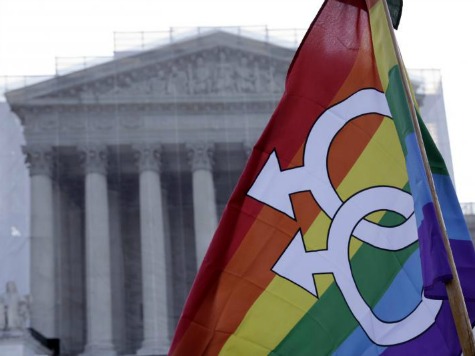
Federal courts in Michigan are dueling over whether the state’s same-sex marriage ban passes rational basis review, as an appeals court halted same-sex marriages in the state Sunday in response to a court ruling overturning the law. The appeals court is scrutinizing the use of rational basis review to overturn a law passed by referendum.
“Rational basis review” is a legal technique to criticize a law that has no “rational basis” to exist, which does not serve any legitimate end. The jurisprudence of Michigan’s DeBoer v. Snyder case [text of full court opinion here] has raised many questions about how to apply rational basis review properly and how difficult the burden to overturn a law by lawsuit should be. In the ruling, U.S. District Judge Bernard Friedman uses a number of psychological and sociological studies to argue that children raised in same-sex households are not at any increased risk of leading less fulfilling lives, concluding that this is enough to overturn the same-sex marriage ban on the grounds that it serves no rational purpose.
The emphasis on children is especially vivid in the Michigan case because of the origins of the story. As the judge explains, the plaintiffs originally only sought to overturn a law that prohibits unmarried couples from adopting so that they could jointly adopt a child. They were not seeking to be married. The Court notes that the complaint was amended to object to the same-sex marriage ban because the deeper reason they could not adopt was that it was illegal for them to marry, not because they were unmarried individuals who could not independently adopt.
The Court then applies rational basis review, which Judge Friedman defines as the need to prove that the law is “rationally related to the achievement of a legitimate governmental purpose.” He writes this just as he quotes another court case explicitly noting that “the government [also] has no obligation to produce evidence to support the rationality of its… [imposed] classifications and may rely entirely on rational speculation unsupported by any evidence or empirical data.” The burden then belongs on the plaintiffs to prove that the law is irrational.
Judge Friedman agrees with the plaintiffs, arguing that their expert witnesses’ claims that children are unaffected by a same-sex marriage upbringing are enough to prove the law is irrational. He notes that “the quality of a person’s child-rearing skills is unrelated to the person’s gender or sexual orientation,” unrelated enough to fail the rational basis test.
However, irrespective of the plaintffs’ argument, he finds irrational the claim that the state seeks to “uphold tradition and morality” and that the state should take a “wait-and-see” approach to the possibility of allowing same-sex couples to marry. “[W]ithout some overriding legitimate interest, the state cannot use its domestic relations authority to legislate families out of existence,” Judge Friedman writes.
“The Supreme Court has held that tradition alone does not satisfy rational basis review,” he argues, nor does any conservative impulse to protect institutions, though he does not note that many with such an impulse have argued against a ban on same-sex marriage.
His argument is interesting, in that even while claiming the opposite, the case seems to demand that government live up to a burden that it does not legally have to live up to – the burden to prove that its laws are rational.
Judge Friedman adds concerns about same-sex marriage to a short list of issues that failed the rational basis test including zoning ordinances that prevent the construction of facilities for the mentally retarded, laws preventing anyone who does not work for a funeral home from selling caskets, and bans on adult movie theaters.
Laws that have survived rational basis review include compulsory sterilization and a ban on transporting milk cut with oil between states.
The Michigan court’s decision does not assault rational basis to the extent that the Utah court decision – which led to a decision comparing same-sex marriage to polygamy – does, but it attempts to move the goal posts on this particular rule’s burden of proof. The practice of marrying same-sex couples has been halted for the time being in the state, but the appeals court stopped the practice to allow for more time to review the appeal – yet another decision that promises to weigh in on the haphazard application of rational basis review.

COMMENTS
Please let us know if you're having issues with commenting.